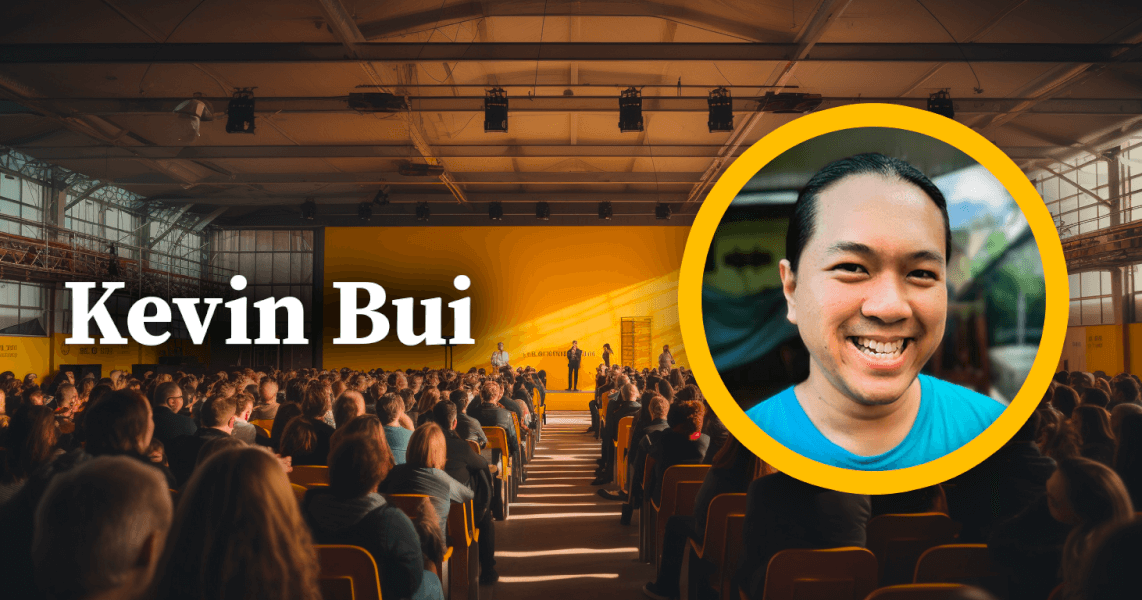One-day virtual conference: Growing In Content 2023
Redesign your career at Growing In Content 2023, whether you're aiming to climb higher in your current role or bouncing back from a career setback. Join us October 26th, 2023.
In the latest entry of our Perspectives series, we shine a spotlight on Jen Dionisio, Associate Director of Content Strategy at EPAM, as she reveals her personal journey through the fields of content strategy and leadership. Jen opens up about her experiences in management, her transformation during the pandemic, and her growth as a certified coach. She offers practical lessons, reflections, and insights that align closely with her core values. Join us as Jen imparts her wisdom on managing people, embracing change, and finding fulfillment in one's work.
Meet our speaker
As a member of the content strategy leadership team at EPAM, Jen works with clients across a variety of industries to design digital experiences that make life easier for end users and content managers alike. Her favorite part of work is helping her team tear down obstacles and celebrate their successes. She continues this work through her coaching practice, supporting people considering professional reinventions get clear on what they want and need - and then put those insights into action.

About this talk
In this presentation, Jen Dionisio delves into the complex world of managing inner adversaries to enhance professional relationships. She begins by exploring the various personas one might encounter, such as The perfectionist, The people pleaser, and The worrier, emphasizing the impact they have on our daily interactions.
Jen then introduces tools and techniques to slow down thoughts and manage oneself, allowing individuals to better align with the managers they aspire to be. Using her own experiences, she shares insights into turning these inner adversaries into friends and allies, supporting personal growth, and fostering a positive managerial environment.
Other videos in this series
Kevin Bui outlines a three-step approach to navigating promotions, focusing on auditing one's skills, reflecting on past projects, and gathering valuable testimonials from colleagues.
Ayesha Akbar Ali shares her journey from copywriting to content design, highlighting the importance of hands-on courses, challenging traditional briefs, and the power of networking and mentorship.
Mike Winnington shares experiences and insights from his initial 150 days as a UX Writing Manager at Doctolib, discussing his transition, struggles, and successes.
Lessons learned from Jen
Understanding Inner Personas
Jen emphasizes the importance of recognizing and understanding the various inner voices, such as the perfectionist, people pleaser, and worrier, that influence behavior and decision-making. By acknowledging these personas, individuals can create a more mindful approach to management and relationships.
Mindful Management
Jen's approach to slowing down thoughts and introspection allows for better alignment with the managerial style one aspires to have. She shares specific tools and techniques to manage oneself before managing others, fostering a more positive environment.
Turning Adversaries into Allies
Embracing inner personas and leveraging them as strengths, rather than hindrances, is a key lesson from Jen's talk. She guides listeners on how to turn these inner adversaries into friends and allies, supporting personal growth and professional success.
Embracing Change and Personal Growth
Reflecting on her own personal growth and the transformative power of coaching, Jen underscores the importance of alignment with core values and embracing change. Her experiences offer valuable insights into the journey of self-discovery and professional reinvention.
About Perspectives Conf
This talk is part of Track #3 - Managing people and content teams of the 2022 edition of our conference.
Perspectives Conf is the world’s first event specifically focused on the careers side of content. It’s been carefully curated to help people at all levels navigate the many facets of working in content – from being the first content person to hiring and growing a team.

Transcript of the talk
00:02 Hi everyone. My name is Jen Dionisio, and I am an associate director of content strategy at EPAM, which is a software consulting company.
00:13 I've been calling myself a content strategist for about eight years or so. Um, but doing the work for something more like 15, like many of you, I started doing content strategy long before I knew there was an actual job associated with it.
00:30 I'll be honest. My first forays into management were kind of traumatic when I joined EPAM in 2017. One of the things I was really excited about was that there was a dedicated, independent contributor track.
00:46 I really thought I'd stay on that track forever, but like so many people, when the pandemic hit, I had a real shift in perspective, pun intended.
00:59 I decided to go through a coaching training program and become a certified coach. And through that work, I realized that managing people was scary still, but it was something that I was really missing in my day to day work life because it aligned so closely to a lot of my core values.
01:21 So I threw my hat in the ring for an open position on the management track. And here I am now
01:29 I directly manage, uh, four content strategists and I'm part of the leadership group that supports our wider team of 25 content strategists.
01:41 This talk will draw on my experiences, both as a coach and a content strategy manager. I do want to let you know, uh, there are no slides.
01:53 So feel free. If you want to put your headphones on, walk around, lay down and listen. Um, do whatever makes you feel comfortable and lets you absorb my words most easily.
02:07 I'll be sharing a link at the end to a workbook that will help you apply the lessons. Um, I share to your own life after this conference.
02:18 So with all that said, let's begin with a story. So picture this, I'm sitting in an all glass conference room with my boss, for my annual performance review.
02:33 She's sitting across from me and the laptop is masking most of her face. So I can't really gauge all of her reactions, but whatever happens, I'm ready for what's coming.
02:47 Or so I thought my boss starts to read the notes on her screen. They say Jen struggles to find footing with the client and the internal team.
03:02 Jen has a habit of avoiding conflict and trying to neutralize negativity, which is a real detriment.
03:10 Jen's lack of expertise in the project. Activities and platform were noticeable. Jen needs to be a more mature and effective teammate.
03:23 She sometimes utterly fails to meet expectations As I'm taking all of this in I'm trying not to cry and I'm trying to fully listen and be present.
03:39 But my boss's voice just starts getting drowned out by a chorus of voices popping up in my head. There's my inner critic.
03:51 Who's saying, see, I told you you were too junior for this project, my inner worrier. You're going to get fired.
04:02 What are we going to do? My inner avoider. Who's thinking great. We're just going to quit this job and move on.
04:13 You can take this as a lesson learned and you'll never have to see these people ever again. And my inner judge who is not very happy.
04:25 She's thinking if people felt this way, why didn't they share it with me? Instead of my boss, Stakes were high.
04:36 And I found myself surrounded by the multitude of these characters, telling me stories to egg me on to comfort me, to critique me and to protect me.
04:52 When my boss finally stopped sharing, I didn't know what to do. So I thank her for her candor and try to keep myself together.
05:04 She leans in then and her eyebrows kind of raised. And she says, that was your self-assessment. She gives me a moment to process because I know my face contorted into just utter confusion And a smile broke across her face.
05:31 And she said, now I'm going to read you what everybody else said. Here's what came off the screen that time, Jen demonstrates great time management skills and commitment to timely delivery.
05:48 I appreciate how efficiently Jen communicates with clients. She's open, proactive, attentive to their needs. Persistent in all the necessary information.
06:01 Jen is and continues to be a consistent rockstar while I've worked with her numerous times, it was the first experience for everyone else on the team.
06:13 The feedback I got was universally positive. There was true disappointment. When we had to give her back to her primary project, The relief washed over me.
06:25 As I realized the stories I've been telling myself, weren't actually true. But after a while that relief turned into something more like horror, as it turns out, I could not trust myself to actually see reality.
06:46 And it wasn't just that moment. I had spent months agonizing over these projects and it turned out I did all of that for nothing.
06:58 What could I have accomplished if I hadn't let these voices take over
07:07 The tyranny of my inner chatter, didn't stop. When I became a manager, it happens just as often and maybe even more now that I'm on the other side of the desk as the one, giving the feedback or settling a disagreement or having to take a hard stand And the stakes feel even higher because it's not just
07:31 me under the influence of these characters. My team is interacting with them too when they take over, But I'm not passive in this process.
07:44 And as I'll explain, neither are you. We can understand and analyze the characters in our heads so that they help us show up better for ourselves and our teammates, whether it's in times of stress or even in times of celebration, I'm going to talk through the process of doing this today.
08:08 So according to Ethan Cross, who is a psychologist who studies internal conversations, our verbal stream of thought is so industrious that according to one study, we internally talk to ourselves at a rate equivalent of speaking, 400 words per minute, out loud.
08:29 That's a lot of opinions to parse simultaneously. For context, I'm speaking to you at like 200 words a minute max.
08:41 So where do all these voices come from and why are they so chatty, if it helps to use a metaphor, I want you to imagine that you have an inner world that of a backstage and a main stage Backstage is where all the different characters you've developed over the course of your life live.
09:07 There's the inner critic, the worrier, the avoider and judge that I mentioned. Um, but there are also so many more, you have main characters that show up again and again, and other bit characters or special guest stars who only appear in unique or especially stressful circumstances.
09:31 They're all backstage waiting for their cue. Then we have our main stage, which is where the action happens. When our characters find a reason to pipe up or participate in what's happening around us, they make their full debut, some burst out on the center, stage some stick to the edges.
09:58 Sometimes they come alone or in groups, sometimes they team up or argue amongst themselves, whatever their personality or communication style, they have a lot of influence over what we do say and think every moment of our lives.
10:18 And that's actually by biological design,
10:23 Aman named Richard Schwartz, who is a psychologist that developed a therapeutic model based on engaging directly with these cast of characters, wrote, all of us are born with many subminds that are constantly interacting inside of us.
10:41 This is in general, what we call thinking because the parts are talking to each other and to you constantly about the things you have to do or debating the best course of action.
10:53 And so on This behavior can be really valuable. We develop these characters over the course of our lives, in reaction to lessons.
11:03 We've learned over time as children, we pick up cues from the people around us as to what's acceptable or unacceptable.
11:14 What earns us praise and what earns us indifference, what causes us pain and what brings us joy. These characters appear in our actions and reactions to protect us and to support us in getting our needs met.
11:33 This behavior leads us astray. When the characters we've developed, haven't evolved much beyond their childish understanding of the world or haven't properly processed, small T or big T trauma.
11:48 Their methods for keeping us safe can be harsh, overdramatic, isolating, and self-destructive. They can keep us from showing up as our true selves.
11:59 Instead, we're wearing a mask of our subconscious reactions and assumptions that as my example showed may not even be based in what's actually happening around us instead.
12:13 It's what we fear might happen
12:17 To give you an example. Let me tell you about another disastrous feedback session. I was part of this time. I was giving the feedback instead of receiving it Let's call the person I was talking to Kara.
12:33 So Kara had been working for me part-time for about a year. She was always incredibly passionate, thoughtful, and eager to help In our monthly meetings she'd be full of ideas.
12:48 But between meetings, she was getting very little work done. She'd expressed some interest in joining us in a full-time role.
12:56 We had open. So I was keeping a close eye on her work And I was pretty underwhelmed. I had no evidence to prove that she could keep up with what we needed her to do.
13:12 And when it came time for our next meeting, this time a one-on-one, I was dreading it. I knew she wanted to have this full-time role, but I just didn't feel like I could offer it to her.
13:27 Before the call, a whole cast of characters came onto my main stage. There was my people pleaser who was agonizing over, possibly disappointing her.
13:40 There was my perfectionist who
13:42 Was
13:43 Furious that the workshe'd neglected kept falling onto my plate instead. And my avoider was just hoping so hard that she'd changed her mind about the promotion.
13:56 So I wouldn't have to give her any tough feedback. I didn't realize that any of these voices were taking the wheel during our call, but in hindsight, I can see that they totally dominated the conversation.
14:14 My people pleaser showered her with compliments and was cheerful and friendly the entire time, which gave a completely fake impression of how I felt like things were going.
14:26 My fixer didn't bother to ask any probing questions about why she wasn't keeping up. Instead. It assumed it already knew the reasons.
14:37 And my avoider wrapped up that 45 minute call without once mentioning the promotion. We said, we'd discuss after all. She hadn't brought it up either.
14:51 So how did that turn out? Well, the next day I received a very frustrated email, submitting her full resignation from the team.
15:02 It said that she was confused and hurt by the fact that I didn't mention the promotion once and that she didn't understand why she wasn't being considered for the role.
15:13 I opened that email in a baseball game and for the next five innings, my head was awash in noise.
15:22 The loudest one was a new voice in the conversation. My worrier, who was on full alert, panicked that I had made her feel so awful.
15:33 My inner critic started berating me for being a coward and for not being direct. My fixer was making really hasty suggestions, mostly saying again, and again, just give her the role.
15:47 It'll be fine. Just do it. And my inner judge, who was still a little salty, it was like, why are you getting this guilt inducing email from someone who hasn't been doing their own work?
16:03 If I knew, then what I knew now, things would have been very different. I would have made those characters allies for both of us, instead of adversaries keeping me from speaking to her like an actual human being.
16:19 You see the goal isn't to winnow the multitudes down to one single voice It's to understand what their intentions are and help them find productive ways to meet those needs.
16:36 So if I were to do it all over again, I would have started by checking in with my avoider before I got on the call, especially knowing that my avoider is always Close to center stage.
16:50 I would find out what it didn't want to deal with and make plans for how to ease those concerns. Before the conversation started, I'd also check in with my worrier about its own fears, Like knowing that it was worried about upsetting her.
17:11 I could start to write down some talking points, around, um, graceful feedback to give Once on the call, my people pleaser didn't have to put on that charade instead of false kindness, it could have been put to better use paying attention, to balancing my critiques with observations of her strengths
17:35 . And my fixer didn't need to have the answers for her. Instead, it could have inquired about what challenges she was facing and then be put to use helping her come up with solutions.
17:48 If an only she wanted that support. What eventually she and I had to talk about what happened. I brought a very different cast on stage.
18:00 There was my inner empath who Wanted to really listen to her perspective. And I brought my inner caretaker for myself to remind me that my intentions had been good.
18:13 Even if things had turned out really badly. I had a little boost from my inner business lady who knew deep down.
18:24 I had made the right decision for the team. Even if it really disappointed this one person.
18:32 And I introduced my inner student who was really eager to know how I could've set her up for success and wanted to take those learnings and apply them in the future.
18:45 The ultimate outcome was bittersweet. She never returned to the team, but out of this tension, we actually became really good friends.
18:54 She finally understood where I was coming from and I also better understood her. The conversation between us and in my head had totally changed.
19:08 So now think about the times at work when your inner chatter gets loudest and most destructive, Maybe it's feedback time, maybe it's when you're presenting to a big crowd.
19:21 Maybe it's when you start to lead a new project, Take just one of those moments and think about what characters show up for you.
19:31 I've shared a bunch of mine, but there are so many more I've seen in myself and others. So of those characters, when do they interfere with your hopes or goals in those moments?
19:46 And on the flip side, how could their energy be used to be helpful? Instead Start a ritual where you do a check-in before you enter any kind of scenario that brings these kinds of voices to center stage.
20:04 If a big meeting has you stressed block off time to check in with your most agitated voices, listen to their concerns, Listen to their advice,
20:17 And
20:17 Then remind them too, of what you need from them. If the less helpful voices are crowding out, your more helpful ones, invite those to the forefront and encourage them to speak up and out
20:32 In the moment. It's never bad to take a pause. If you need it, you can even acknowledge who's with you.
20:40 Think about any time you or someone else has said. A part of me feels like this, but another part of me feels like you can actually be candid about who's showing up.
20:53 It can be really illuminating to acknowledge that you're weighing the council of very different perspectives and experiences. And afterwards, take time to check in with anyone who showed up and anyone who you expected to be there, that wasn't ask how they felt, what they learned, what they might do
21:15 differently. Next time, treat them with compassion and give that same compassion to yourself. As the director of this unruly performance, it can feel a little awkward at first.
21:30 Like, am I really having all these dialogues with myself? I get it. But eventually you can have them so quickly.
21:39 You barely notice that they're happening. It starts to become automatic. And you'll start to see more of yourself shining through in your interactions.
21:49 Your teammates will see it too, who hasn't had a boss that didn't have their different characters under control. Is she going to show up short today or distracted or sad?
22:04 Our colleagues start to armor themselves against the unpredictability of who might show up to their one-on-one and that influences how they interact with us as their managers, after all.
22:17 How do you trust the feedback of someone who isn't direct with you? How do you share your concerns? If your manager's critic is always center stage, how do you grow?
22:27 If your manager is always fixing your problems, you don't. We owe it to ourselves and we owe it to the people around us to understand what baggage we're bringing into our conversations.
22:42 When your next show starts. I hope your multitudes are in supporting roles with you on center stage. So show is over curtains fold, but there's still work to do.
23:01 I put together a guide to help you start the conversation with your own primary cast. It'll help you identify your most helpful and disruptive voices.
23:12 Maybe you share similar ones. To me, maybe yours are totally different. I'll be sharing the link with you, but reach out to me directly if you need access after the conference wraps up.
23:27 Thank you so much. I look forward to hearing who you uncover.
Want to know when the next video from Perspectives Conf is published on our website? Sign up for our weekly newsletter in the box below to get notified.




















